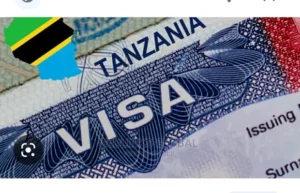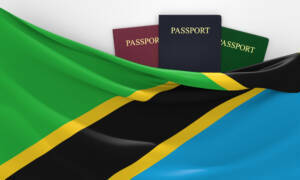Uncategorized
Tanzania Visa Application: A Comprehensive Guide
Planning a trip to the beautiful and diverse country of Tanzania? Whether you’re drawn to the breathtaking landscapes, stunning wildlife, or vibrant cultural heritage, understanding the Tanzania visa application process is essential for a smooth and hassle-free journey. This comprehensive guide will walk you through the necessary steps, requirements, and important information to ensure your visa application is successful.
From understanding the various visa types to knowing the application procedures, we’ll provide you with the knowledge and resources needed to navigate the Tanzania visa application process with confidence. Let’s embark on this exciting journey together and unlock the wonders of Tanzania.
Requirements for an Tanzania Visa Application

When applying for a visa to visit Tanzania, there are certain requirements you need to fulfill. These requirements may vary based on the purpose of your visit, such as tourism, business, or study. Here are the general requirements for a Tanzania visa application:
- Completed Application Form: Fill out the visa application form accurately and ensure that all information provided is correct and up to date.
- Valid Passport: Your passport should be valid for at least six months from the intended date of entry into Tanzania. It must also have a minimum of two blank pages for visa stamping.
- Passport-Sized Photographs: Attach two recent passport-sized photographs with a white background to your application form.
- Flight Itinerary: Provide a copy of your confirmed round-trip flight itinerary indicating your entry and exit dates from Tanzania.
- Proof of Accommodation: Submit documentation that confirms your accommodation arrangements during your stay in Tanzania, such as hotel reservations or an invitation letter from a host.
- Financial Proof: Show evidence of sufficient funds to cover your expenses while in Tanzania. This can include bank statements, traveler’s cheques, or credit card statements.
- Yellow Fever Vaccination Certificate: If you are traveling from or through a country with a risk of yellow fever transmission, you may need to present a valid yellow fever vaccination certificate.
- Supporting Documents: Depending on the purpose of your visit, you may be required to provide additional documentation, such as a business invitation letter, a student enrollment letter, or a letter of sponsorship.
- Visa Fee: Pay the appropriate visa fee, which can vary based on your nationality and the type of visa you are applying for. Fees are typically payable in cash or money order.
READ ALSO: K1 Visa Application: Ultimate Guide
Type of Tanzania Visa
There are several types of visas available for individuals planning to visit Tanzania. The specific type of visa you need will depend on the purpose of your visit. Here are some common types of Tanzania visas:
- Tourist Visa: This visa is for individuals planning to visit Tanzania for tourism purposes, such as sightseeing, wildlife safaris, or leisure activities. It is usually valid for a single entry or multiple entries within a specified period.
- Business Visa: If you are traveling to Tanzania for business-related activities, such as attending meetings, conferences, or exploring potential business opportunities, you will need a business visa. It allows for a temporary stay in the country for business purposes.
- Student Visa: Individuals planning to pursue studies or participate in educational programs in Tanzania must apply for a student visa. This visa is typically granted to those enrolled in recognized educational institutions in Tanzania.
- Transit Visa: If you are transiting through Tanzania en route to another destination and will remain in the country for a short period, you may require a transit visa. It allows you to stay in Tanzania for a specified duration while in transit.
- Volunteer/Charity Visa: For individuals planning to engage in volunteer work or participate in charitable activities in Tanzania, a volunteer or charity visa is necessary. This visa is usually issued for a specific period and requires documentation from the organization hosting the volunteer.
- Work Permit: If you intend to work and reside in Tanzania for an extended period, you will need to apply for a work permit. Work permits are granted to individuals who have secured employment in Tanzania and fulfill the necessary criteria.
How To Apply for Tanzania Visa
To apply for a Tanzania visa, follow these steps:
- Determine the Visa Type: Identify the appropriate visa type based on the purpose of your visit, whether it’s tourism, business, study, or another category.
- Gather Required Documents: Collect all the necessary documents for your visa application, including a completed application form, valid passport, passport-sized photographs, flight itinerary, proof of accommodation, financial proof, yellow fever vaccination certificate (if applicable), and any supporting documents specific to your visa type.
- Find the Nearest Tanzanian Embassy or Consulate: Locate the Tanzanian embassy or consulate nearest to you. Visit their website or contact them directly to obtain the specific visa application requirements, fees, and procedures.
- Complete the Application Form: Fill out the visa application form accurately and legibly. Double-check all information provided before submitting the form.
- Prepare Supporting Documents: Compile all the required supporting documents as outlined by the embassy or consulate. Ensure they are organized and ready for submission.
- Pay the Visa Fee: Determine the visa fee amount based on your nationality and visa type. Make sure you have the required payment method (cash or money order) accepted by the embassy or consulate.
- Submit the Application: Visit the Tanzanian embassy or consulate in person or follow their instructions for online or mail-in applications. Submit your completed application form, supporting documents, passport, and visa fee payment.
- Schedule an Interview (if required): Some visa types may require an interview as part of the application process. If applicable, schedule an interview at the designated time and location.
- Track Application Status: If available, use the embassy’s or consulate’s online tracking system to monitor the progress of your visa application. Alternatively, contact the embassy or consulate for updates.
- Collect Your Visa: Once your visa application is approved, collect your passport with the visa stamped in it. Verify the accuracy of the visa details before departing for Tanzania.
Tanzania Immigration Rule Applicant Must Know

When applying for a visa or entering Tanzania, it’s important to be aware of the immigration rules and regulations. Here are some key immigration rules that applicants should know:
- Valid Passport: Ensure your passport is valid for at least six months beyond your intended stay in Tanzania. It should also have a sufficient number of blank pages for visa stamps.
- Visa Requirement: Check if you require a visa to enter Tanzania based on your nationality. Some countries have visa-exempt agreements with Tanzania, allowing visitors to enter without a visa for a specified period. For others, a visa is required, and it must be obtained before travel.
- Visa Extension: If you are already in Tanzania and wish to extend your stay, it’s important to apply for a visa extension at the immigration office before your current visa expires. Overstaying your visa may result in fines, deportation, or other penalties.
- Compliance with Visa Conditions: Adhere to the conditions specified on your visa. If you have a specific purpose for your visit, such as tourism or business, engage only in activities allowed under that visa category.
- Residence Permits: If you plan to live, work, or study in Tanzania for an extended period, you may need to apply for a residence permit or work permit, depending on the nature of your stay. Consult the Tanzanian immigration authorities for the specific requirements and procedures.
- Yellow Fever Vaccination: Tanzania requires a valid yellow fever vaccination certificate from travelers arriving from countries with a risk of yellow fever transmission. Ensure you have been vaccinated against yellow fever and carry the appropriate documentation if necessary.
- Prohibited Items: Familiarize yourself with the list of prohibited items when entering Tanzania. These may include firearms, illegal drugs, counterfeit goods, and certain food or plant products. Non-compliance with these regulations can result in serious legal consequences.
- Customs Declarations: Declare any valuable or restricted items when entering Tanzania, especially if you exceed the duty-free limits. Failure to declare goods or providing false information can lead to confiscation, fines, or legal actions.
- Respect Local Laws and Customs: Observe and respect local laws, customs, and cultural sensitivities while in Tanzania. Familiarize yourself with local customs, dress codes, and social norms to ensure a respectful and pleasant experience.
- Departure Requirements: Make sure to comply with any departure requirements, such as paying applicable departure taxes or fees, before leaving Tanzania.
Conclusion
In conclusion, understanding the Tanzania visa application process and immigration rules is crucial for a successful and hassle-free visit to this captivating country. By familiarizing yourself with the specific visa requirements, gathering the necessary documents, and following the proper application procedures, you can increase your chances of obtaining a visa smoothly.
Additionally, being aware of the immigration rules and regulations ensures that you adhere to the guidelines and have a lawful and enjoyable experience in Tanzania. Remember to stay updated with any changes in visa regulations and consult the official sources or Tanzanian embassy/consulate for the most accurate and current information. Embark on your Tanzanian adventure well-prepared and make lasting memories in this land of extraordinary beauty and rich cultural heritage.





